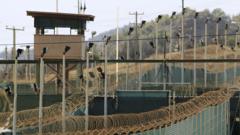The United States has transferred 11 Yemeni detainees from Guantanamo Bay to Oman, further reducing the facility’s population to just 15. The transfer was announced by the Department of Defense, which expressed gratitude to Oman for collaboration in reducing the detainee count and working towards the eventual closure of the prison. Importantly, none of the detainees had faced charges during their over two-decade incarceration following the September 11 terrorist attacks.
This move precedes a significant legal event, as Khalid Sheikh Mohammed, the alleged architect of the 9/11 attacks, is set to plead guilty in a deal to avoid the death penalty. This latest group transfer is the largest under President Joe Biden’s administration, signaling a potential shift in the US’s long-standing approach to detainee management.
The resettlement of these detainees has been in planning for years, due to concerns over Yemen's instability caused by civil war. Among those transferred was Moath al-Alwi, known for his hobby of crafting model boats during his detention, and Shaqawi al Hajj, who was noted for his protests against his lengthy imprisonment through hunger strikes. The Defense Department emphasized that their transfers were in line with national security interests per assessments by federal review panels.
This transfer follows a prior release of an original detainee back to Tunisia and comes as three of the remaining detainees are also identified as eligible for transfer. The military prison, established by the Bush administration in 2002, peaked with approximately 800 detainees, leading to continued scrutiny regarding the ethical implications of detaining individuals without charges.
Previous administrations have tried to address the challenges surrounding Guantanamo. Barack Obama criticized the facility for contradicting American values and damaging foreign relations, facing Congressional opposition against his attempts to close it. His successor, Donald Trump, pushed back on these efforts, aiming to showcase a hardline stance on terrorism. Since taking office, Biden has revived efforts to reduce the detainee population and work towards closure, though persistent political challenges remain.
This move precedes a significant legal event, as Khalid Sheikh Mohammed, the alleged architect of the 9/11 attacks, is set to plead guilty in a deal to avoid the death penalty. This latest group transfer is the largest under President Joe Biden’s administration, signaling a potential shift in the US’s long-standing approach to detainee management.
The resettlement of these detainees has been in planning for years, due to concerns over Yemen's instability caused by civil war. Among those transferred was Moath al-Alwi, known for his hobby of crafting model boats during his detention, and Shaqawi al Hajj, who was noted for his protests against his lengthy imprisonment through hunger strikes. The Defense Department emphasized that their transfers were in line with national security interests per assessments by federal review panels.
This transfer follows a prior release of an original detainee back to Tunisia and comes as three of the remaining detainees are also identified as eligible for transfer. The military prison, established by the Bush administration in 2002, peaked with approximately 800 detainees, leading to continued scrutiny regarding the ethical implications of detaining individuals without charges.
Previous administrations have tried to address the challenges surrounding Guantanamo. Barack Obama criticized the facility for contradicting American values and damaging foreign relations, facing Congressional opposition against his attempts to close it. His successor, Donald Trump, pushed back on these efforts, aiming to showcase a hardline stance on terrorism. Since taking office, Biden has revived efforts to reduce the detainee population and work towards closure, though persistent political challenges remain.





















